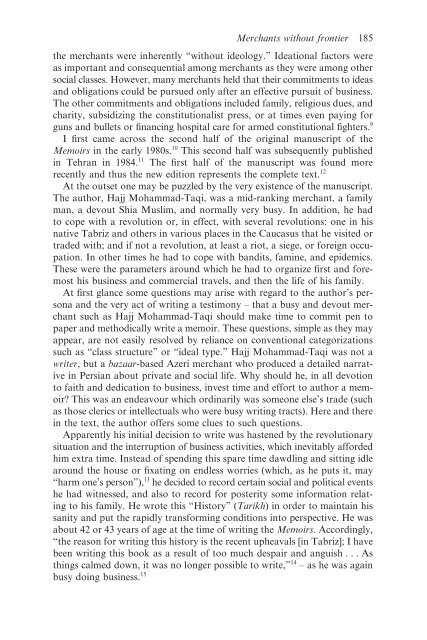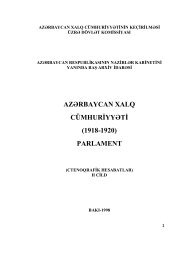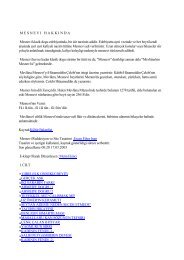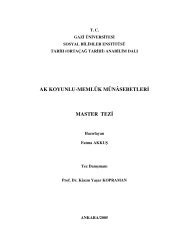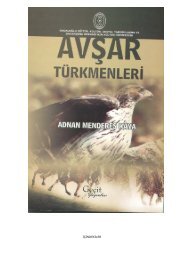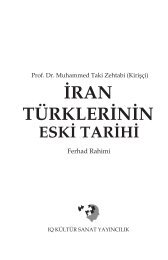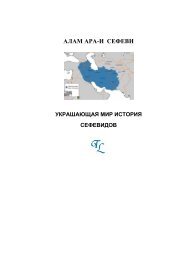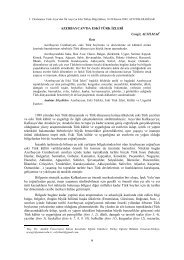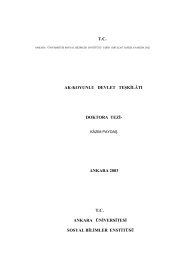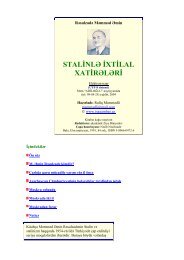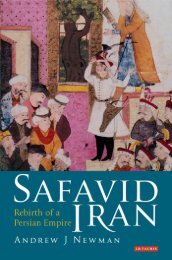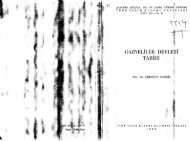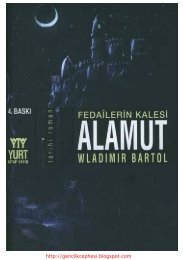War and Peace in Qajar Persia: Implications Past and ... - Oguzlar.az
War and Peace in Qajar Persia: Implications Past and ... - Oguzlar.az
War and Peace in Qajar Persia: Implications Past and ... - Oguzlar.az
- No tags were found...
Create successful ePaper yourself
Turn your PDF publications into a flip-book with our unique Google optimized e-Paper software.
Merchants without frontier 185the merchants were <strong>in</strong>herently “without ideology.” Ideational factors wereas important <strong>and</strong> consequential among merchants as they were among othersocial classes. However, many merchants held that their commitments to ideas<strong>and</strong> obligations could be pursued only after an effective pursuit of bus<strong>in</strong>ess.The other commitments <strong>and</strong> obligations <strong>in</strong>cluded family, religious dues, <strong>and</strong>charity, subsidiz<strong>in</strong>g the constitutionalist press, or at times even pay<strong>in</strong>g forguns <strong>and</strong> bullets or f<strong>in</strong>anc<strong>in</strong>g hospital care for armed constitutional fighters. 9I first came across the second half of the orig<strong>in</strong>al manuscript of theMemoirs <strong>in</strong> the early 1980s. 10 This second half was subsequently published<strong>in</strong> Tehran <strong>in</strong> 1984. 11 The first half of the manuscript was found morerecently <strong>and</strong> thus the new edition represents the complete text. 12At the outset one may be puzzled by the very existence of the manuscript.The author, Hajj Mohammad-Taqi, was a mid-rank<strong>in</strong>g merchant, a familyman, a devout Shia Muslim, <strong>and</strong> normally very busy. In addition, he hadto cope with a revolution or, <strong>in</strong> effect, with several revolutions: one <strong>in</strong> hisnative Tabriz <strong>and</strong> others <strong>in</strong> various places <strong>in</strong> the Caucasus that he visited ortraded with; <strong>and</strong> if not a revolution, at least a riot, a siege, or foreign occupation.In other times he had to cope with b<strong>and</strong>its, fam<strong>in</strong>e, <strong>and</strong> epidemics.These were the parameters around which he had to organize first <strong>and</strong> foremosthis bus<strong>in</strong>ess <strong>and</strong> commercial travels, <strong>and</strong> then the life of his family.At first glance some questions may arise with regard to the author’s persona<strong>and</strong> the very act of writ<strong>in</strong>g a testimony – that a busy <strong>and</strong> devout merchantsuch as Hajj Mohammad-Taqi should make time to commit pen topaper <strong>and</strong> methodically write a memoir. These questions, simple as they mayappear, are not easily resolved by reliance on conventional categorizationssuch as “class structure” or “ideal type.” Hajj Mohammad-Taqi was not awriter, but a b<strong>az</strong>aar-based Azeri merchant who produced a detailed narrative<strong>in</strong> <strong>Persia</strong>n about private <strong>and</strong> social life. Why should he, <strong>in</strong> all devotionto faith <strong>and</strong> dedication to bus<strong>in</strong>ess, <strong>in</strong>vest time <strong>and</strong> effort to author a memoir?This was an endeavour which ord<strong>in</strong>arily was someone else’s trade (suchas those clerics or <strong>in</strong>tellectuals who were busy writ<strong>in</strong>g tracts). Here <strong>and</strong> there<strong>in</strong> the text, the author offers some clues to such questions.Apparently his <strong>in</strong>itial decision to write was hastened by the revolutionarysituation <strong>and</strong> the <strong>in</strong>terruption of bus<strong>in</strong>ess activities, which <strong>in</strong>evitably affordedhim extra time. Instead of spend<strong>in</strong>g this spare time dawdl<strong>in</strong>g <strong>and</strong> sitt<strong>in</strong>g idlearound the house or fixat<strong>in</strong>g on endless worries (which, as he puts it, may“harm one’s person”), 13 he decided to record certa<strong>in</strong> social <strong>and</strong> political eventshe had witnessed, <strong>and</strong> also to record for posterity some <strong>in</strong>formation relat<strong>in</strong>gto his family. He wrote this “History” (Tarikh) <strong>in</strong> order to ma<strong>in</strong>ta<strong>in</strong> hissanity <strong>and</strong> put the rapidly transform<strong>in</strong>g conditions <strong>in</strong>to perspective. He wasabout 42 or 43 years of age at the time of writ<strong>in</strong>g the Memoirs. Accord<strong>in</strong>gly,“the reason for writ<strong>in</strong>g this history is the recent upheavals [<strong>in</strong> Tabriz]; I havebeen writ<strong>in</strong>g this book as a result of too much despair <strong>and</strong> anguish ...Asth<strong>in</strong>gs calmed down, it was no longer possible to write,” 14 – as he was aga<strong>in</strong>busy do<strong>in</strong>g bus<strong>in</strong>ess. 15


